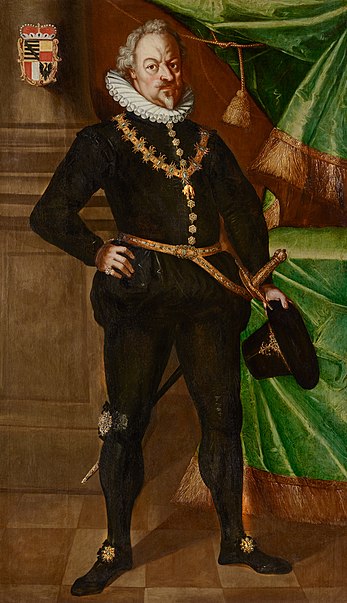 |
| Elizabeth, Queen of Bohemia |
The Joys of Monarchy
Rupert was
christened on 31st March 1620 in Prague[i]; the ceremony was followed
by a magnificent feast and the next day Frederick’s friend Baron Christopher
Dhona was married to his long time love and the celebrations continued. There
was no stinting in the entertainments enjoyed by the court; no-one would think
the treasury was virtually empty;
‘From day to day such was
the jollity of King Frederick, his queen, his brother, the Duke of Wirtemberg and
the lords and ladies of the court that none could have formed the idea of the
intanglements abroad or the perplexities at home.’[ii]
Elizabeth
was totally without any political understanding and she looked to her father
for support against the Catholic counter revolutionaries. James refused to
recognise Frederick as King of Bohemia and went so far as to apologise to
Ferdinand for his son-in-law’s actions.
James was
perennially short of cash and he was concerned about keeping the peace at home
and abroad. At this time he believed that conciliating Spain was the best way
to do this. Indeed he had plans to marry Charles to one of the Spanish
Infantas. By 1620 he was disillusioned, writing of monarchy in a way that his
son-in-law should have taken to heart;
‘Look not to find the
softness of a down pillow in a crown but remember that it is a thorny piece of
stuff and full of continuous cares.’[iii]
Loss of a Throne
 |
| Margrave of Brandenburg-Anspach |
In August the
army of the Protestant Union led by the Margrave of Brandenburg-Ansbach, although numerically superior, were
persuaded by the French not to meet the Catholic League forces in battle. The
enemy were led by Maximilian of Bavaria,. Although the resultant agreement
bound the league and the Union not to invade the Palatinate, it did not bind
the Spanish armies led by Spinola.
Matters in
Europe were complicated by the Ottoman invasion of Poland[iv] and on 7th
October 1620 the Battle of Cecora[v] brought an Ottoman victory. Further
south the Spanish sent an army under Spinola to support Ferdinand. The
Protestant Elector of Saxony had also been persuaded to join the imperial
forces determined to topple Frederick off his precarious throne.
On 8th
November 1620 the Battle of White Mountain[vi] signalled the end of Frederick’s
tenuous hold on Bohemia when the royal forces led by Christian of Anhalt fell
before the might of the imperial armies and he was taken prisoner.
 |
| Battle of White Mountain |
The royal
family beat a hasty retreat from Prague; Elizabeth was placed in a private
carriage by Bernard, the son of Count Thurn. And Rupert nearly got left behind
in the desperate scramble; Baron Dhona threw the baby into one of the
carriages. Their journey to Breslau[vii] was complicated by a heavy fall of
snow.
The royal
family’s reception in Breslau was cool and the family travelled on to Frankfurt an Oder. Fearful for her and her family’s future, Elizabeth
wrote to her father;
‘Your Majesty will
understand by the king’s letters how the Palatinate is in danger of being
utterly lost if your majesty gives us not some aid. I am sorry we are obliged
to trouble your majesty so much with our affairs, but their urgency is so great
that we cannot do otherwise.’[viii]
 |
| George-William, Elector of Brandenburg |
From
Frankfurt Frederick sent a courier to his brother-in-law George William, Elector of Brandenburg, to ask if
Elizabeth, again pregnant, could undertake her confinement at Frederick’s
castle at Custrin. After the intercession of
Frederick’s sister Elizabeth and of the English envoy Sir Henry Wotton, George gave grudging acceptance to the request and
the family arrived on 14th December.
Elizabeth
gave birth to Maurice on the 17th in a castle
with none of the trappings of splendour that had surrounded her in Prague.
Rupert and Henry Frederick accompanied their mother to the Netherlands. The
young Henry Frederick wrote of this journey
I have taken a long journey
from Prague to the Netherlands and am now in Friesland
with Count
Ernest of Nassau.’[ix]
Maurice was
taken to Berlin to be cared for by his paternal grandmother Juliana, who
prevailed upon the Elector of Saxony to intercede with Ferdinand for Frederick,
albeit unsuccessfully.
Loss of the Electorate
.jpg/483px-Ambrogio_Spinola_(Michiel_Jansz_van_Mierevelt%2C_1633).jpg) |
| Spinola |
And now the
loss of Bohemia was to be exacerbated by the loss of the Palatinate; Spinola
invaded the Electorate. On 21 January 1621, Ferdinand issued a decree against
Frederick and Christian. The pair were accused of breach of peace, supporting
rebels, and treason. Ferdinand decreed that Frederick's lands and titles within
the Holy Roman Empire were forfeit.
On 6
February 1621, representatives of the Protestant Union met with Ferdinand at Heilbronn to protest the decree, but were persuaded to support the settlement in
the Palatinate. The Palatinate remained occupied by Spanish troops. At this
point, the Protestant Union had essentially ceased to exist.
To make his
victory even more meaningful Ferdinand cancelled the Letters of Majesty; the
Protestants in Bohemia could no longer raise churches on royal land or worship
whom they pleased.
 |
| Karl von Leichtenstein |
Ferdinand
also declared the lands of those who had supported Frederick forfeit and attempted
to sell them off. Due to the large amount of land for sale buyers were few and
prices low. So to raise funds Ferdinand debased the coinage and ended up bringing
hyper-inflation to the region.
With
worthless money buyers for the forfeited lands flooded in; the Protestant
aristocracy were replaced by good Catholics while the merchant class were
destroyed. Karl von Liechtenstein, the man Ferdinand appointed as
governor of Bohemia, purchased eight properties. One man purchased sixty six
estates; the Protestant Wallenstein who was to become Ferdinand’s military supremo.
The War Gains Momentum
An appeal in
England was set up to raise money for the Palatinate and Prince Charles gave
£10,000[x]. Sufficient monies to
support military intervention would have to be awarded by parliament which
James called and on 30th January 1621 he told MPs;
‘I am to provide for
wars…….and nothing can be expected from you without begging as a man would beg
for arms.’[xi]
James
resented having to beg parliament for money and was horrified when MPs
discussed his conciliatory foreign policy. No monies were forthcoming and James
trusted to the new King of Spain, Philip IV to restore the Palatinate to Frederick, a trust that was
unfounded.
 |
| Christian of Brunswick-Luneberg |
Frederick
and Elizabeth now faced a future as pensioners of their families and friends.
Elizabeth’s uncle Christian IV of Denmark sent six thousand troops to support
Frederick. Frederick could also count on the support of his general Mansfeld
and Christian, Duke of Brunswick-Lüneberg, one of
Elizabeth’s cousins, who seems to have been partly motivated by a chivalric love of Elizabeth;
‘What will become of a
worthy cousin-german of mine, Duke Christian of Brunswick, of whom, I am sure,
you have heard of; he hath engaged himself only for my sake in our quarrel.’[xii]
The Margrave of Barden-Durlach
and Count Thurn also supported
what seemed like a lost cause for the Protestants. James sent a few thousand
troops under the leadership of Sir Horace Vere. Against them were ranged the Catholic
League’s forces led by Tilly.
On 18th
April 1622, following a terrible few months when the Rhine burst its banks and thousands drowned, the fecund Elizabeth gave birth
to Louise who was to become a talented
portrait painter[xiii]
like her brother Rupert.
The new Elector
 |
| Seal of Heidelberg University |
In February
1623 Ferdinand formally transferred the Electorate of the Palatinate to
Maximilian of Bavaria, despite the opposition of all the Electors save
Maximilian’s brother. The situation in Europe was different; Spain did not want
Maximilian in the Palatinate, Archduchess Isabella wanted Frederick to hand
over to Henry Frederick, his eldest son, to be educated in Vienna and ultimately
married to one of the Emperor’s daughters. James was in favour of the Archduchess’s
proposals, even though it would almost undoubtedly involve Henry Frederick’s
conversion to Catholicism.
Maximilian
had support in Rome where the Vatican was the recipient of the sack of
Heidelberg; the contents of its great library, the Bibliotecha Palatina,
were now held in their archives. The Pope was also averse to the potential
increase in Hapsburg power that would follow from having an Elector marry the
Emperor’s daughter. Maximilian gained an Electorate at the expense of the
Electors’ liberties.
Bibliography
Gustavus
Adolphus the Great – Nils Ahnlund, 1999 History Book Club
Memoirs of
Elizabeth Stuart, vol 2 – Elizabeth Benger (ed), General Books LLC 2012
The Early
Stuarts – Godfrey Davies, Oxford University Press 1987
King James –
Antonia Fraser, BCA 1974
Charles I –
Christopher Hibbert, Penguin 1968
The Thirty
Years War – Herbert Langer, Dorset Press 1990
The Thirty
Years War – CV Wedgewood, Folio Society 1999
www.wikipedia.en
[ii]
Memoirs of Elizabeth Stuart vol 2 – Benger (ed)
[iii]
King James - Fraser
[iv]
The Poles supported Ferdinand
[v]
A three week battle
[vii]
Now Wroclaw
[viii]
King James – Fraser
[ix]
Memoirs of Elizabeth Stuart, vol 2 – Benger (ed)
[x]
In 2013 the relative: historic standard of
living value of that income or
wealth is £1,819,000.00
economic
status value of that income or
wealth is £53,250,000.00 economic power value
of that income or wealth is £356,300,000.00 www.measuringworth.com
[xi]
King James - Fraser
[xii]
Memoirs of Elizabeth Stuart, vol 2 – Benger (ed)
No comments:
Post a Comment
Note: only a member of this blog may post a comment.